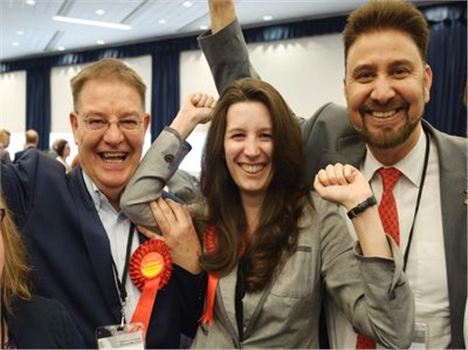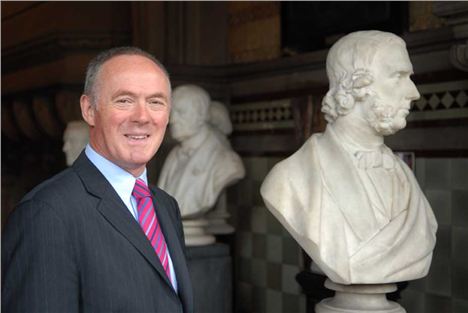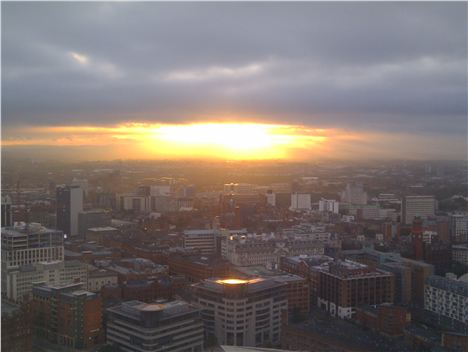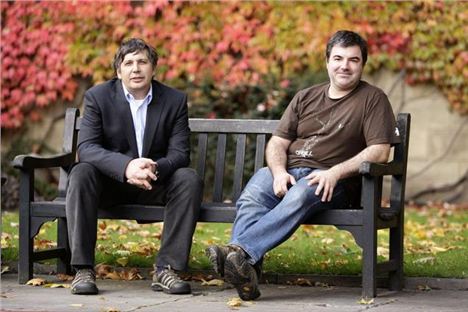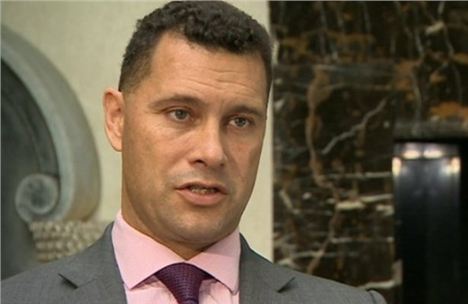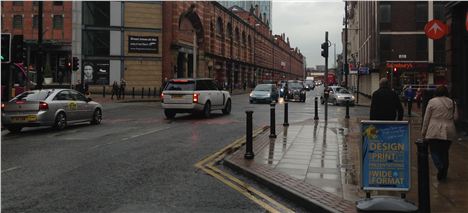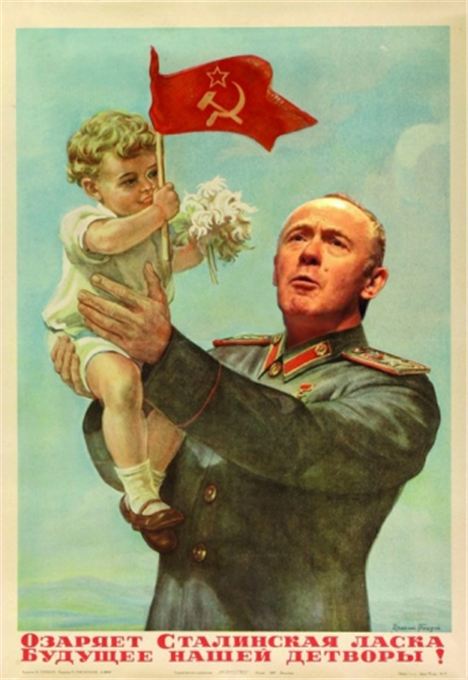"IF you find a Conservative in Manchester you should put him in a glass case," said one of the greatest nineteenth century British statesmen, John Bright.
After the recent local elections in the city of Manchester in 2014 it's time to find a glass case for the Liberal Democrats. And all the other parties.
Manchester has 96 councillors, 95 of whom are now Labour. As for the 96th, he's Independent Labour, and he's called Henry Cooper. If he's going to be the opposition he'll have to punch way above his weight.
It's raining red - thanks to the Manchester Evening News for the pic
So while it was UKIP here, UKIP there, UKIP everywhere, Manchester was different. There was a bit of a UKIP surge, particularly in Moston, but nothing to dislodge Labour.
For the first time a major UK city has become a one party administration. Manchester is politically the reddest place on these islands.
The turnout, by the way, was 37% and in line with the national turnout. This was better than recent local elections, but it was still a meagre number. The city centre shamed itself with a 17% turnout.
Liberal Democrats wipe out and Green shoots?
"Was the result from 22 May down to the failure of other parties or an endorsement of Labour in Manchester?" I ask Sir Richard Leese, the leader of the city council's red hordes despite his football affiliation as a fully signed up Blue.
"We gained over 57% of the vote share," he said. "That was down a little on two years ago but still a strong endorsement of what we have achieved and want to achieve. We campaigned well across the city and got the reward."
Sir Richard Leese (on the left)
Was he shocked by the way the other parties performed?
"I wasn't shocked by the result," says Leese. "At the moment there is no natural opposition party. We had the Liberal Democrats as some sort of opposition but even before this year's results most of the intelligent examination of policy came from within the Labour Group."
He pauses, "In fact I don't think there are any natural Liberal Democrats. It's a don't-know-what-to-vote party that's paid the price for broken promises nationally. I know people who voted for them at the last general election who despise Coalition polices and now say 'I didn't vote for a Tory government'. They're finished for a while."
Lib Dem prospects according to the Council Leader
We tried to get a response from the Lib Dems to this savaging but the phone number listed on their website was saying 'calls are currently not being connected to this number'.
Leese is right about the lack of natural opposition in Manchester. A look at the second places to Labour is revealing.
The Greens came second in thirteen wards, UKIP in eleven wards, Liberal Democrats in six, the Conservatives, BNP and Independents came second in one ward each. Most of these were very distant seconds.
That lack of a clear front-runner even for second place shows how chaotic the political position behind Labour has become.
Dick Venes of Manchester Green Party says, "We were pleased by our increased share of the vote to 12%, 20% in some wards, and look forward to gaining places in the Council in the not too distant future - perhaps. We could be the natural opposition but given the disparity in money resources between ourselves and say, Labour, that is difficult.
"We campaign on principles and policies, on spreading the wealth across Manchester and not being fixated on the city centre and the Airport for example. We don't have the big party machine of the others though, its hard to get our voice heard. This year it was worse with the media obsession with UKIP."
New political dawn over Manchester
'UKIP are nasty, rightwingers'
After the Greens with eleven second places came UKIP - the reason for the Labour Party's slightly reduced share of the overall vote. UKIP gained less than 8% of the vote share, lower than the Conservatives in Manchester, although they stood in fewer wards.
While UKIP were the national headline makers, in Manchester they only came close to success in Moston, losing out by 137 votes.
"Does the Manchester result, as with London, reveal a divide between the big UK cities and the rest of the nation?" I say. "Manchester it seems to me has benefited from immigration in recent years. The hollowed out parts of the inner city are being occupied by people who bring dynamism, activity and aspiration - although of course there can be problems. What seems clear is the perceived anti-immigration rhetoric of UKIP doesn't seem to play so well in big cities."
Leese can't restrain a chuckle.
"The UKIP communications director said on Radio 4, after last the results, that the party does less well in London because people are more diverse, younger and better educated. It was kind of her to underline the truth about UKIP."
(UKIP Party spokesperson Suzanne Evans actually said it was the'educated, cultural and young' who'd ignored UKIP in London. But Leese isn't too wide of the mark).
"It was close in the election in Moston but remember until fairly recently much of Moston Lane was boarded up," says Leese. "Immigration might have been an election issue that affected Moston but immigration has brought new life as you say. We need to keep reminding people that UKIP are a nasty, brutal, rightwing party with policies underpinned by racism. We need to get that message over."
"If you were in a marginal ward or constituency that might not be so easy to declare. You might be more circumspect," I say.
"I disagree," says Leese with force. "I think much of the UKIP success has come from pandaring to them, especially from the Conservatives. Immigration is all UKIP are known for, other parties have been trapped into the same single issue. Meanwhile businesses and universities and sensible commentators keep telling us that UKIP's anti-immigration policies are a nonsense."
"So the message is immigration is good for Manchester and we should celebrate it?" I say.
"Immigration has been good for Manchester and the whole country," agrees Leese. "Immigration from other parts of the UK and overseas has been part of our success. In Manchester we need to upskill our present population but we also need people coming in from abroad with new ideas. The indigenous population is aging too, so who will pay pensions in future years?"
Historically he's right, althought the use of the word 'upskill' is disturbing. In Manchester progress has often been led by 'incomers' from home and abroad - just look down the list of the University of Manchester's 25 Nobel prizewinners.
Graphene Nobel prizewinners: Geim and Novoselov, 'incomer's' both
Cities have always sucked in the talented. They've always sucked in populations looking for better opportunities. It's a two way street. Cities need new populations as much as the incomers need cities. As people move out of inner areas, new populations move in. So it goes and has always done.
It remains to be seen whether UKIP can grow the close result in Moston into a council seat. It remains to be seen whether the attitude of Sir Richard Leese will eventually see them off.
Steven Woolfe, a North West MEP for UKIP, originally from Moss Side understandably didn't approve of Leese's language: "As one of the country's best paid councillors and leader of my city of birth, Manchester, it is a great regret that Sir Richard Leese has descended into the less palatable side of British politics.
"This level of abuse matches the level of misunderstanding of UKIP's fair and ethical immigration policy that is based on non-discrimination and listening to the public's honest demands for a more balanced migration policy. It is supported by candidates who come from the broad range of British society which reflects the public's views on this issue."
Woolf describes himself as a "mixed Mancunian" selected by UKIP "on a national membership vote, not by any positive discrimination list". He offers in his long statement to debate the issues with Sir Richard Leese. We'll pass on that offer.
Steven Woolfe UKIP MEP
How does a single party city police itself?
"Perhaps the biggest problem people have with the election result in Manchester is the death of any opposition in the council chamber. Given your total domination how will the Labour Group police itself?" I ask.
"Remember we do have 95 opinions in the Labour group, 95 individuals, all with their own ideas," says Leese. "Unlike the Parliamentary party, all the councillors vote on the policies and initiatives we pursue.
"We're also seeking new ways of opening up the council so, for example, we always start full meetings with a presentation from someone outside the administration. Recently we had a presentation on youth unemployment. This enables people and professionals with other skills to help us make informed decisions.
"There are unwhipped motions from Labour councillors too. A motion on the Living Wage was adopted recently. Personally I'd also like to make sure executive members of the council get a tougher time inside and outside the Town Hall. This election result places a big responsibility on us to make sure we stay close to the electorate. We need to make sure councillors are aware of this."
"To stay close to the electorate means you have to listen," I say. "There's chatter around the city that once the council has made a decision then any subsequent consultancy is a sop, tokenism."
Leese says: "I believe our track record is all about listening to people. If things aren't working then let's have a look at them. That's been our way."
We talk about consultations concerning the swimming pool and library closures, city centre management and so on. Inclusion and social justice is mentioned.
We disagree on whether the council has truly listened to much of what's been said after its edicts have been delivered.
"It's ok to say you were wrong on occasion and change tack?" I say at some point in the circular argument.
"But we do reconsider," says Leese as city centre traffic management rears its ugly head, in particular Deansgate.
Road traffic management stupidity - how to create hazard where there wasn't one previously
"I am going to look into the pavement extensions at Liverpool Road and Quay Street," says Leese. "We've received numerous comments that these might be dangerous, so let's see what needs to be done."
"With on-street city centre parking," he says, "I commissioned a survey following your (Manchester Confidential's) articles and the results of the survey supported our case. City centre visits are up and higher than in comparable centres across the country despite your fears of on-street parking extensions damaging the city centre. That's us listening if not agreeing. At the same time I'm aware things need simplifying with parking. There are 12,000 NCP car parking spaces and yet no two-car parks have the same rates. It needs to change."
I mention that the obsinate and purblind nature of the response to criticism of the dreadful mistake of the Piccadilly Gardens' 2002 refurbishment doesn't auger well for any self-policing.
Leese points out the success compared with the sunken gardens that formerly occupied Manchester's largest central public area. I counter by pointing out the gardens were so hideous any change would have seen improvement in usage figures especially tied to a surge in visitor numbers.
Pushed on the notorious wall, the wayward fountain and the 'lawns', Leese says, "we can only enact change when there is the money to do so."
This is the clincher. There are so many pressing issues in management and maintenance and essential sevices but the City of Manchester has little money and more cuts are looming.
The local media don't cut it
Looking back over the interview I realise I should have talked more about social justice than relative frippery such as Deansgate, but the answer to the issue of how will the Labour Group police itself - the reason for the interview - seems clear.
Despite all the reassurances of listening, consultation and innovative council sessions there are no guarantees.
The electorate of the City of Manchester, the ones who could be bothered voting, have created a one party state - if not technically, given there are other parties to vote for, then in reality.
Sir Richard Leese's words on how an opposition-free Manchester city council will work aren't reassuring. Truth is there is no real mechanism in place to rigorously examine Labour Group policies. Within legal boundaries they are now their own judge and jury.
It gets worse. It's hard to see how decisions made at the top can be effectively challenged by members within the 'back benches' of the council given the formidable control character of the executive.
So it's clear what the City of Manchester requires then, isn't it?
It needs a tough Fourth Estate to scrutinise council policies, to examine the Town Hall.
Sadly there is no such Fourth Estate in Manchester. Does any UK city still have one?
Most local media is no longer up to it and doesn't seem to care either. The changed world of digitalisation has left the media bereft of resources and worse bereft of the will to challenge the local establishment.
At best the Manchester press and broadcast media is now reactive, relying on leaks rather than legwork, at worst it is obsessed by Corrie stars, footy players and crime stories to the near exclusion of anything else. Maybe some amateur might stumble upon something and 'blog' it to a few hundred like-minded people but then it will probably fade into the white noise of the internet.
It seems we must learn to trust our councillors completely in Manchester.
An idea
Or is there another way?
Surely the Labour Group in Manchester, deep down, can see a blanket Labour representation carries a bitter taste, smells bad in a democracy.
Here's an idea.
To counter this unwelcome 'first' for a major UK city, maybe the council should deliver another 'first' for a Labour administration and campaign for proportional representation in local elections. At least then we'd be guaranteed some opposition in the council chamber.
Don't hold your breath though.
With council leader, Sir Richard Leese so scathing of the Liberal Democrats and UKIP, it seems he won't be leaping at the opportunity to open a Town Hall door to them soon.
 The Dodo OppositionIn Manchester we host the People's History Museum, which is also branded 'The Struggle For Democracy'.
The Dodo OppositionIn Manchester we host the People's History Museum, which is also branded 'The Struggle For Democracy'.
Oh the irony.
In this radical free thinking city of Bright, Cobden and Pankhurst, where people at Peterloo died for the vote, democracy has eaten itself, and delivered one party, one vision.
Maybe the People's History Museum can add to its exhibits, the glass case holding the last Liberal Democrat, the last elected opposition.
And finally...how long might Sir Richard Leese continue as Leader?
There was a momentary aside as we chatted Labour's domination.
"After 18 years as Council Leader, you're no spring chicken. Have you thought about retirement from the post?" I said to the 63-year-old Sir Richard Leese
"There's still a lot of work to do," he says. "While the Labour Group have confidence in me and while they want me to say leader - and they all have a say in that - then for the time being I'll continue."
Leese lists some of the work he does nationally with the HS2 campaign, the Core Cities group, the Association of Greater Manchester Councils, the Airport and so on and so forth. It's very impressive stuff. You can't deny his energy or his intellect or his position nationally.
"Even George Osborne (the Conservative Chancellor of the Exchequer and Tatton MP) recently complimented the work we've done in Manchester. While we disagree with him and what he's doing, we'll still take that," says Sir Richard Leese.
I recently took a group of Northern European journalists around the city and mentioned the Council Leader's length of tenure. They were astonished. Most of their respective cities give leaders a maximum of two terms.
"Don't worry," says Sir Richard Leese, "we won't have a gerontocracy in Manchester."
It'd be pleasant to have a more diverse democracy.
But remember the Labour Group is only so dominant because it was voted in by the people of the City of Manchester. And getting voted in is what political parties are all about after all.
You can follow Jonathan Schofield on Twitter @JonathSchofield or connect via Google+
Forward together as the one and only party








